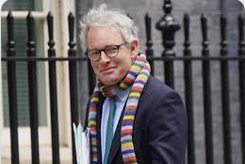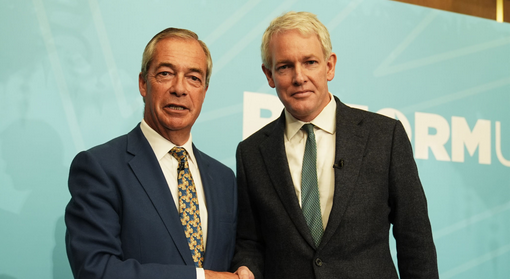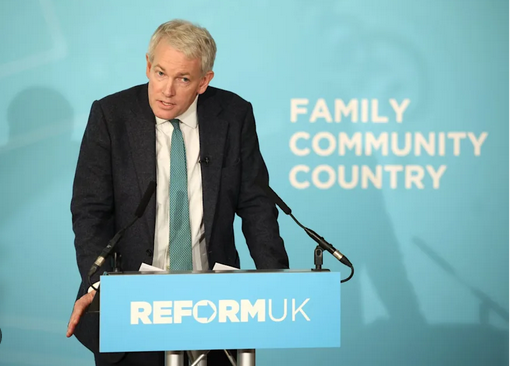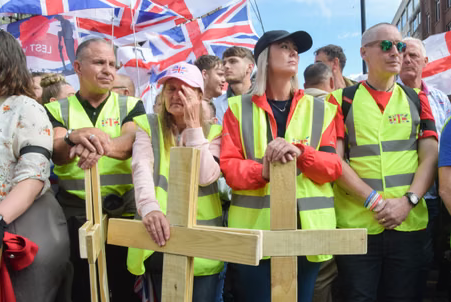A nightmare in Old Compton Street: we need to talk about Danny Kruger

TetleysTLDR: The summary
Danny Kruger, ex-Tory turned Reform Party darling, and poster boy of Christian Nationalism wraps bigotry in tweed and scripture. Posing as a genteel moralist, he preaches 'Christian virtue' and 'covenant' while promoting a reactionary project: fusing national identity with an exclusionary, nostalgic Christianity. His book Covenant dresses authoritarianism as community spirit: 'home, neighbourhood, duty' as code for obedience, patriarchy, and the erasure of queer and secular life. Kruger's rhetoric isn't harmless nostalgia, it builds the ideological scaffolding for state-sanctioned moral policing. His speeches and networks at National Conservatism events legitimise extremist groups like the self-styled 'King's Army', whose homophobic marches through Soho turn faith into intimidation. By lending parliamentary respectability to this Christian nationalism, Kruger provides cover for far-right mobilisation under a hymn sheet. Behind the linen civility lies a politics of control: a pastoral fascism that threatens pluralism, weaponises religion, and seeks to redraw who counts as English — and who must disappear.
TetleysTLDR: the long bit
Danny Kruger is what happens when the Daily Mail discovers theology, a sanctimonious little zealot in a tweed jacket, frothing about 'Christian virtue' while pining for a Britain that never existed. Once a Tory speechwriter and policy wonk, now a Reform Party defector, he’s clawed his way into political relevance by preaching a gospel of moral panic. In his head, England was 'founded as a Christian nation', and every act of kindness since has apparently depended on God, empire, and heterosexual marriage. Kruger’s book Covenant dresses up his bigotry as philosophy: all talk of 'home, neighbourhood and nation' as if oppression were a parish hobby. He rails against secularism, feminism, and anything that smells faintly of equality, calling modern liberalism “a pagan heresy.” It’s not theology; it’s weaponised nostalgia. Behind his talk of duty and faith is a demand for obedience, for women to stay dutiful, for gay people to stay invisible, and for the state to bless it all with a crucifix and a Union Jack. His brand of Christian nationalism gives parliamentary cover to the thugs who dream of a 'King’s Army', an England purified of dissenters, migrants, and queers. He’s not just wrong; he’s dangerous. The smile is polite, the tone genteel, but the politics are medieval and if Kruger ever gets his way, Old Compton Street, The Old Market and Canal Street will be battlegrounds again, where freedom once fought fascism in drag and heels, and where it may have to do so once more.
Danny Kruger presents himself in public like a kindly curate with a parliamentary pass: tweed, a quietly measured voice, the air of someone whose politics are merely a gentle suggestion to 'bring back the virtues'. But the measured voice is the problem. Under the linen-jacket civility and the talk of 'neighbourhood' and 'covenant' there is an explicit project: to fuse national identity and public life with a narrow, exclusionary, and historically selective Christian creed. That fusion is not high-minded nostalgia. It is an ideology with teeth and a route map for institutional change that threatens the freedoms of women, queer people, religious minorities and anyone who doesn’t fit Kruger’s gilded little ideal of Englishness.

Let’s be blunt here. Kruger’s political career, from Conservative speechwriter and policy wonk to backbench MP, was never merely technocratic.
He has spent a decade building intellectual architecture for a politics that weaponises Christian language to defend an older social order. His book Covenant: The New Politics of Home, Neighbourhood and Nation dresses up exclusionary nostrums in respectable prose and policy frames: home, duty, neighbourhood, marriage, civic obligation. On the face of it these are uncontroversial words. In Kruger’s hands they become a moral grammar of conformity. (Book & reviews: Kruger, Covenant; reviews: Premier Christianity, Conservative Home). Amazon.
Why should this worry anyone beyond the usual suspects? Because Kruger’s rhetoric is not only sentimental rhetoric about 'neighbourhood'. It is the sort of policy language that creates permission structures inside government and public life. When an MP insists the nation was 'founded as a Christian nation', and when he frames secular liberalism as a form of 'pagan heresy', he does more than offend secular historians; he normalises a vision of the state where legal rights, public institutions and cultural recognition are conditional on religious conformity. That is not a theoretical fear: these arguments are the conceptual scaffolding for policies that would roll back pluralism and hand the state’s imprimatur to a single religious tradition. (See Kruger’s Commons speech and commentary). Parallel Parliament
Kruger’s institutional playbook has always been twofold. First: legitimate the idea of Christian political identity inside existing conservative networks, the think-tanks, the National Conservatism gatherings, the ecclesiastical backchannels where clergy and MPs swap platitudes about 'revival'. He has done this openly; he spoke at National Conservatism events and positioned his thought as part of a transatlantic effort to recapture 'culture' from liberal modernity. Second: stitch that high-level intellectual project to street-level mobilisation by signalling sympathy with groups that use Christian language as a cover for direct intimidation. That stitching is what turns gingham-cheeked sermons about duty into a politics that empowers bullies on high streets. (On Kruger and NatCon; reporting and analysis). National Conservatism

Which brings us nicely to the “King’s Army”, covered by this site on Monday Christian Fascism and the practical danger of what Kruger advocates. If your starting point is the abstract 'a return to Christian politics' it can seem like mere rhetorical posturing. But words have consequences. In the autumn of 2025 a group calling itself the 'King’s Army' marched through Soho, wearing matching uniforms and chanting Christian slogans while accosting people in Old Compton Street, the beating heart of London’s queer social life. This wasn’t a charity outreach with leaflets; by numerous eyewitness accounts and reporting it was an intimidating, explicitly homophobic mobilisation that used Christian-nationalist language to turn public space into theatre of exclusion. That is the real-world endpoint of Kruger’s 'covenant' talk when it leaks off the page: organised moral policing and the weaponisation of faith as a cloak for public harassment. (Reporting: Humanists UK, Scene Mag, PremierChristian). Humanists UK
Don’t be fooled by the language of 'evangelism' or 'community restoration'. Many of the outfits now wrapping themselves in hymn sheets are not merely spreading religious belief, they are performing a politics of boundary enforcement identical in function (if not in form) to historical moral panics. They march in uniform, they chant slogans, they target queer neighbourhoods by design. This is not accidental. It’s a tactic: build a spectacle, create fear, claim victimhood when pushed back. And when an MP like Kruger places those ideas in a parliamentary context, when he delivers House speeches that valorise a 'Christian nation' - he supplies the public legitimacy that fuels recruitment and fundraising for marginal groups.
If you want to trace the architecture of influence, follow Kruger’s networks. His public presence is neatly connected to National Conservatism conferences and a cluster of think-tanks and charities that promote a religiously inflected conservatism, places where 'Judeo-Christian values' are invoked as a tastefully packaged antidote to multiculturalism and secular pluralism. These forums are not academic salons disconnected from politics: they have been a pipeline for funding, political messaging and international exchange between illiberal movements in the US, Europe and beyond. That cross-pollination is what turns 'localism' and 'neighbourhood' into policy proposals intended to remake schools, the civil service, and public culture along explicitly religious lines. (See NatCon, Byline Times, and investigative pieces). National Conservatism
Equally important is how Kruger’s politics intersects with parties on the move. His public defection from the Conservatives to Reform UK in September 2025, a headline that signalled not merely a shift of seats but an ideological realignment, matters. Reform under Nigel Farage has sought to mainstream a hardline, populist platform; Kruger’s arrival gives it a veneer of theological respectability and intellectual coherence that can be leveraged to normalise its proposals. That trajectory is not benign: the combination of populist institutional overhaul and a Christian-nationalist cultural agenda is a potent cocktail. (Defection reporting: The Guardian, Reuters, FT, ITV). The Guardian

We would do well not to paper over the consequences. When a political actor argues that social stability depends on a narrow model of family and calls for the state to privilege that model, you are looking at the blueprint for policy interventions that will criminalise or marginalise alternative family forms, limit sex-education, roll back reproductive rights, and increase hostility to LGBTQ+ visibility. Kruger’s insistence that 'marriage between men and women' is the basis of a safe society is not a neutral sociological claim; it is a political posture aimed at re-allocating rights and social support to those who conform. That posture dovetails with far-right tropes about 'replacement', 'decline', and cultural erosion: arguments that have been weaponised across Europe to justify exclusionary immigration policy and the reshaping of civic life. (Kruger quotes and positions; analysis). Seen & Unseen
Now to the question many will ask: is Kruger directly organising street mobs? The answer is important and nuanced. There is no suggestion he is leading “King’s Army” parades with a megaphone. But politics rarely needs a direct phone call to have effect. The legitimacy conferred by parliamentary speeches, think-tank backing and public endorsements creates an atmosphere where street formations feel emboldened. When MPs speak in the Commons about the 'failure of secular modernity' and prominent online influencers retweet footage of uniformed marches, it makes intimidation feel less marginal and more part of a legitimate cultural push. That permissive environment is the mortar between public rhetoric and street action. (Analysis of linkages; examples of permissive rhetoric). Parallel Parliament
Which far-right actors should readers watch? We should have no intention of providing operational contact details for extremist groups, rather to I pointing you to investigative reporting and watchdog analysis that documents contemporary far-right networks in the UK and how they intersect with Christian nationalist rhetoric. Groups and movements that have featured in reporting around Christian-nationalist and far-right activity in recent years include (for critical reading): Patriotic Alternative (extremist street-level nationalist organising), organised national-conservative forums that host illiberal international figures, and a scattering of evangelical street groups that now explicitly embrace political spectacle. The most reliable reporting and monitoring on these trends comes from watchdogs and journalists: HOPE not Hate maintains rolling analyses of the far right’s tactics and recruitment, Byline Times and The Guardian have done sustained reporting on the NatCon/Christian nationalist interplay, and Humanists UK has documented the specific incidents in Soho and the emergence of groups calling themselves the “King’s Army.” Use those sources, not the groups’ own propaganda pages, to trace connections and funding. (Watchdog & reporting links). Hope Not Hate
If you need specifics to bolster a legal or campaigning dossier, here are the practical follow-up lines of evidence to gather and the sources that can help you gather them:
- Parliamentary record and speeches. Kruger’s Commons contributions, adjournment debates and published speeches show the rhetorical throughline from “covenant” to policy ideas. (Hansard & related reportage). Parallel Parliament
- Conference appearances and networks. NatCon, allied think-tanks and the speaker lists that place Kruger beside known national-conservative actors reveal the international vector. (NatCon pages; Byline Times investigations). National Conservatis
- Watchdog analyses. HOPE not Hate’s briefings and the Humanists UK reports document how Christian rhetoric is being repurposed to justify exclusionary politics, and their files contain references to smaller groups and events. (Hope not Hate; Humanists UK). Hope Not Hate
- Media reporting of street incidents. SceneMag, PremierChristian, Humanists UK and mainstream papers recorded the Soho marches and provide eyewitness accounts and footage. These are the on-the-ground records that show the tactics and the targets. (SceneMag, PremierChristian, Humanists UK). Scene Magazine

All of this forms a mosaic: speeches in Parliament, intellectual networks in think-tanks, conference podiums, reporting on uniformed street demonstrations. Alone, each fragment may be dismissed as eccentric or fringe. Together, they are a strategy: a respectable face for a regressive, exclusionary programme; a recruitment pipeline from conferences to the high street; a rhetorical licence for moral policing.And for those who will object that this is 'just religion' being expressed in public - well spare me. Religion in public life is not the problem. The problem is the type of religion: not plural, not open, not pluralistic; instead a fusion of tribal identity, nostalgia and state preference that would refashion public institutions to conform with a selective religious interpretation. A plural secular state does not deny religion; it protects the freedom of all faiths and none.
Kruger’s vision is tribal: it insists on a dominant creed that becomes the measure of who belongs and who does not.So what should be done? Expose, document, and contest. Call out politicians who lend legitimacy to street intimidators. Use the parliamentary record to force public answers. Support watchdogs and local networks that provide evidence and legal challenge. Amplify the voices of those who live under the threat: Soho business owners, queer activists, community organisers. Political ideas that wear a collar must be treated like political ideas — contested in public, fact-checked, and opposed in policy terms.
“The Jewish and Christian God is a God of nations. This nation, England … was founded and created consciously on the basis of the Bible …”
Danny Kruger. Funding the future
Whatever polite euphemisms Kruger prefers, 'covenant', 'neighbourhood', 'duty', they do not change the outcome of the politics they defend. That politics produces less freedom and more policing of difference. It produces moral panics that become policy. It sanctifies exclusion and when it meets street formations that are willing to act out that moral panic in uniform and chant, the result is intimidation in the open air: a performance designed to shrink public space for queer people, migrants, dissenters.
Danny Kruger is not just a man with a book. He is the midwife and the priest for a political movement that aspires to give religious memory state privilege. Whether he realises the full consequences or simply fails to care is not the point. The effect is the point and the effect is this: from the Commons to Old Compton Street, a campaign is underway to remap who counts as 'English' and who is allowed to occupy the public square. That remapping is intolerant, illiberal and, in practice, dangerous.
In short: Kruger’s politics is a kind of pastoral fascism, soft in tone, hard in ends. It will not be defeated with Victorian religiosity or by telling him to be less polite. It will be defeated by naming it, documenting its linkages to street formations, and mobilising a broad-based political counterweight that defends secular pluralism and the right of every citizen to walk a public street without being told they are a moral abomination. If Old Compton Street becomes a test case, and the “King’s Army” have tried to make it one, then the fight there will be about whether Britain remains a space where difference is protected, or whether it becomes a stage for a singular creed to reassert dominance.
Neither Danny Kruger or the toxic Christian Nationalism he is pushing have a place in our society.
Tetley is a left of centre writer and retired musician based in the UK. A former member of the Labour Party, he writes political analysis exposing Britain’s authoritarian drift, the criminalisation of protest, and the erosion of civil liberties.
A bit of shameless self-plugging here. This is www.TetleysTLDR.com blog. It's not monetised. Please feel free to go and look at the previous blogs on the website and if you like them, please feel free to share them.

